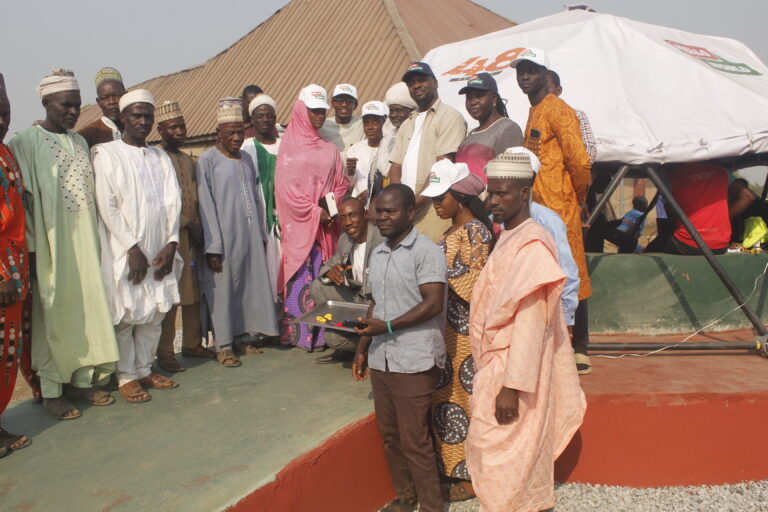Providing Hello Hub training with Hello World
Providing internet access to people in hard-to-reach areas requires innovative ideas. We work with Hello World to provide connectivity knowledge to people in Nigeria.

Project status: Closed
Country: Redirected to Nigeria
Partner: Hello World
Impact goal: Minimum 500 people
About the project
Hello World will work with local partners and communities in Nigeria to close the digital divide and address the education deficit. Through this project, they will deliver internet connectivity and world-class educational software to marginalized communities via the Hello Hub model.
Results
Hello World worked for several months on trying to get into Gaza in order to set up this project. However, difficulties in border crossing caused the project to be delayed several months. In October 2023 it became clear that the project was not feasible, and together we decided that the project should be redirected to a different area that faces similar challenges in terms of connectivity and education. The project was therefore redirected to Nigeria.
Fiona and David, two of Hello World’s Directors from Uganda spent December 2023 training. CITAD remotely, before spending two weeks in Abuja, Nigeria in January 2024. Throughout these two weeks, they delivered training to the CITAD team and 14 community trainees, which included hands-on engineering skills in how to construct a Hello Hub, in-depth inclusive community management skills and collaborative sessions on how to adapt the model to suit the Nigerian context. The result of this training is that a team in Nigeria now has the engineering and community management skills to build context-appropriate Hello Hubs in their own communities. Additionally, trainees developed their own Hub sustainability plans which will be implemented in their communities once the Hubs are built. The training week ended successfully with the completion of a functioning Hub in Dakwa community. This Hub will serve around 1200 people with access to the internet and the hardware to use it. There was an official handover ceremony in Dakwa attended by the whole community who endorsed the Hub and signed an official MoU with CITAD for community-led Hub Management. Hello World collected feedback from the trainees to understand their experience of the training.
An unexpected outcome of the project was the number of partnerships established with local providers and others working in the digital divide space in Abuja and more widely across Nigeria. Hello World hosted a launch event attended by ministers, other digital divide NGOs, the UK Mission in Nigeria and members of industry interested in supporting the work. A great number of conversations, fundraising and partnerships are beginning to develop as a result of this event, spreading the impact of the work further and more quickly. Six more communities are now ready to build Hubs within their communities, which will benefit over 8,400 people.
Beneficiaries
This project benefitted 4 distinct groups:
- CITAD TEAM (around 8 people): following a month of preliminary training online, Fiona and David worked to build capacity within the team at CITAD in Abuja, teaching them all of the work that goes into building a Hub. This included community engagement, procurement, financial management and how to implement the Hello World model. CITAD mentioned specifically that this helped them to refine their procurement processes, building capacity more widely for their work in Nigeria.
- Community trainees (14 people): trainees read Hello World’s How to Guide in detail before beginning the in person training. They then attended the week-long training, learning all the Skills to build a Hello Hub,with a particular focus on crafting sustainable plans for their Communities to manage their Hubs in the long term.
- Hub users (around 1200 people): as part of the training, one whole Hello Hub was constructed with the Dakwa community. This process allowed the community trainees to see the Hub building process from start to finish, and marked the beginning of the construction of Hubs in the communities of the other trainees. Members of the Dakwa community were deeply involved in the Hub construction, learning transferable engineering skills and establishing ownership of the Hub. The Hub now connects the whole of Dakwa community to the internet (estimated 1200 people), as well as providing an invaluable clean powersource, shelter and touch-screen tablets with world-class educational software.
- The Hello World team: The support from 48 percent has allowed Hello World to test this model for scaling our work and test the Hub in a new context. Hello World is implementing this learning currently by updating our online instruction manual for ‘How to Build a Hub Guide’ and refining our training model approach ahead of a similar training that will be delivered in Burundi in April.
Changes and unforeseen challenges
Initially, this training project and Hub build was planned for Gaza. However due to challenges in getting entry to the country and then the following security concerns and ongoing conflict, this project was not possible. In collaboration with 48 percent, Hello World was able to redirect this funding to a similar style project in Nigeria.
Hello World anticipated that working in a new context and new country would bring a lot of learning and challenges. It was certainly a challenge to procure equipment in Abuja. In Uganda and Nepal, they have established relationships with manufacturers built over time to acquire better deals. Procurement therefore took up a significant amount of time before the training, finding the best value vendors. In the future, they plan to have an extra visit to new countries in order to work on early procurement.
About the partner
Hello World is a United Kingdom based organization. Their goal is to bridge the digital divide by connecting hard-to-reach communities to online education and Wifi connectivity.
Visit their website here to learn more about them.